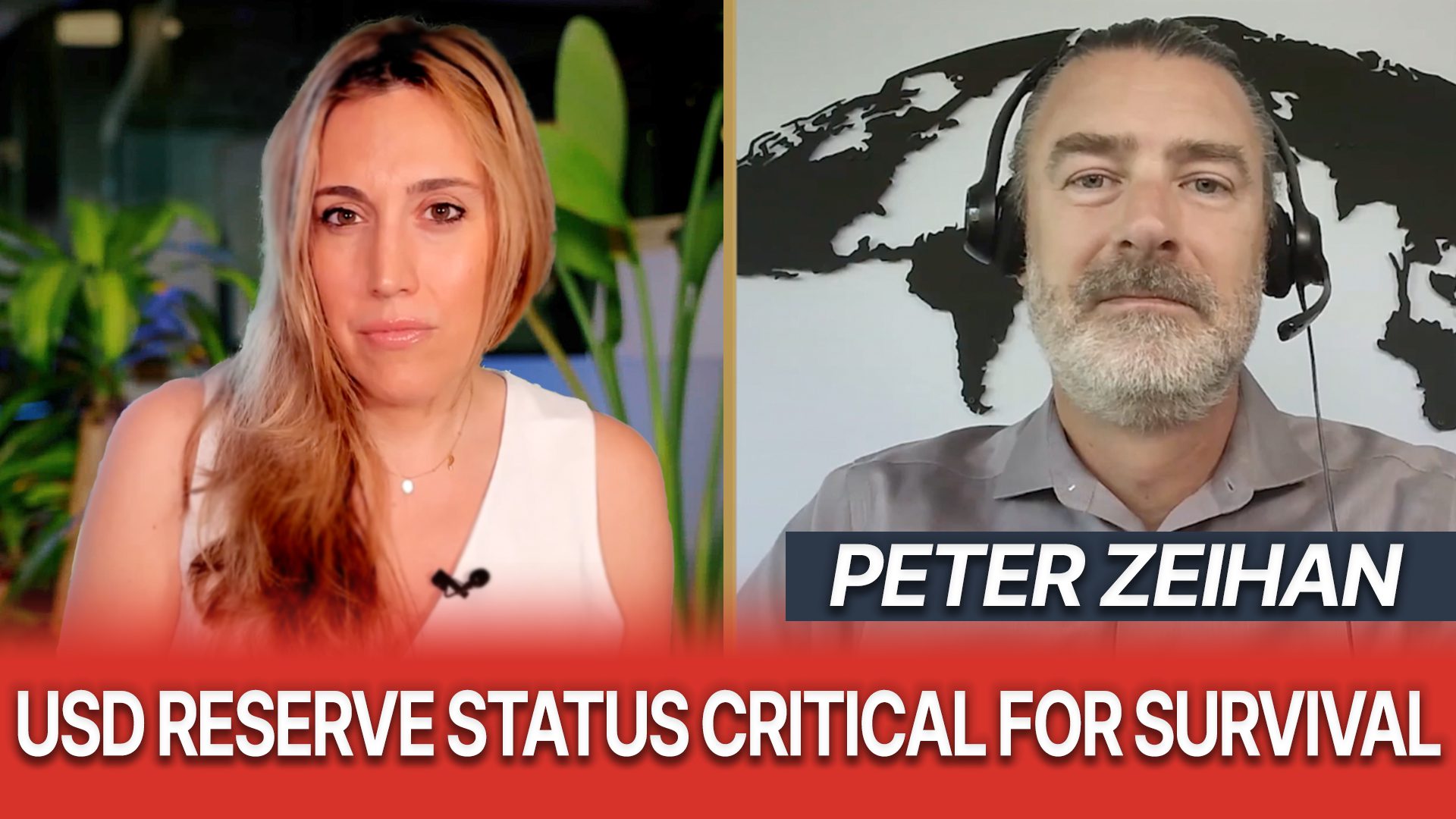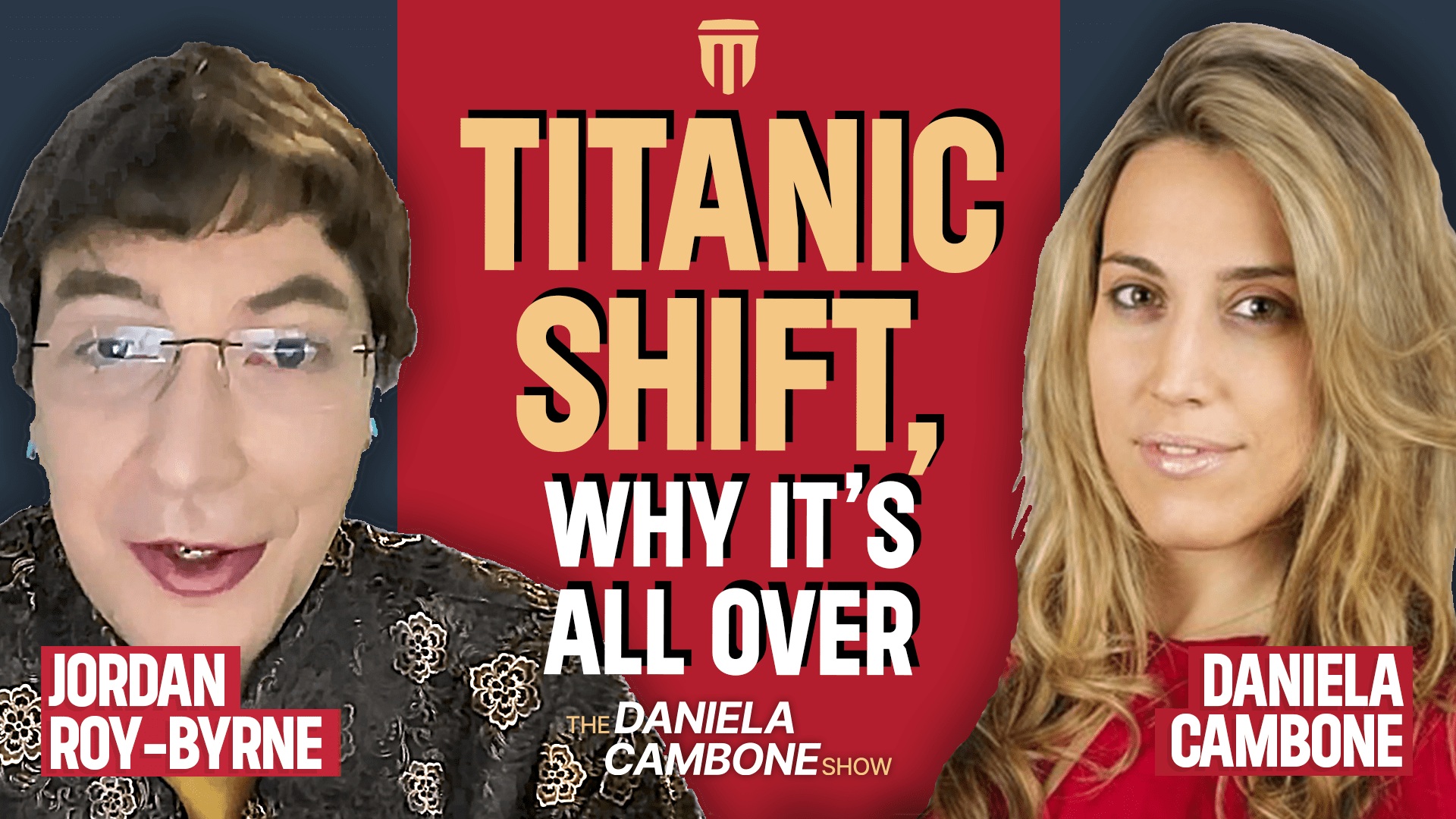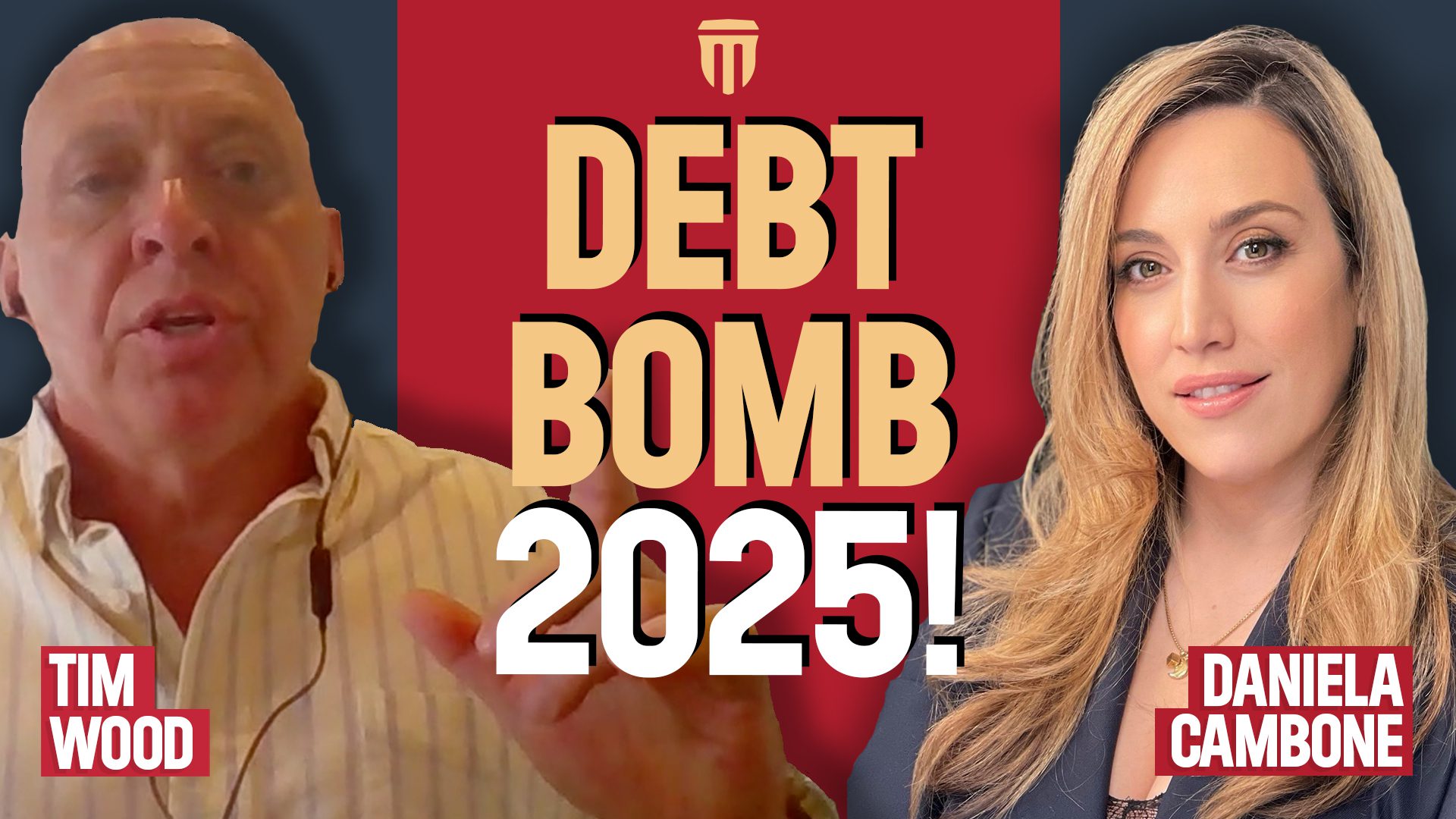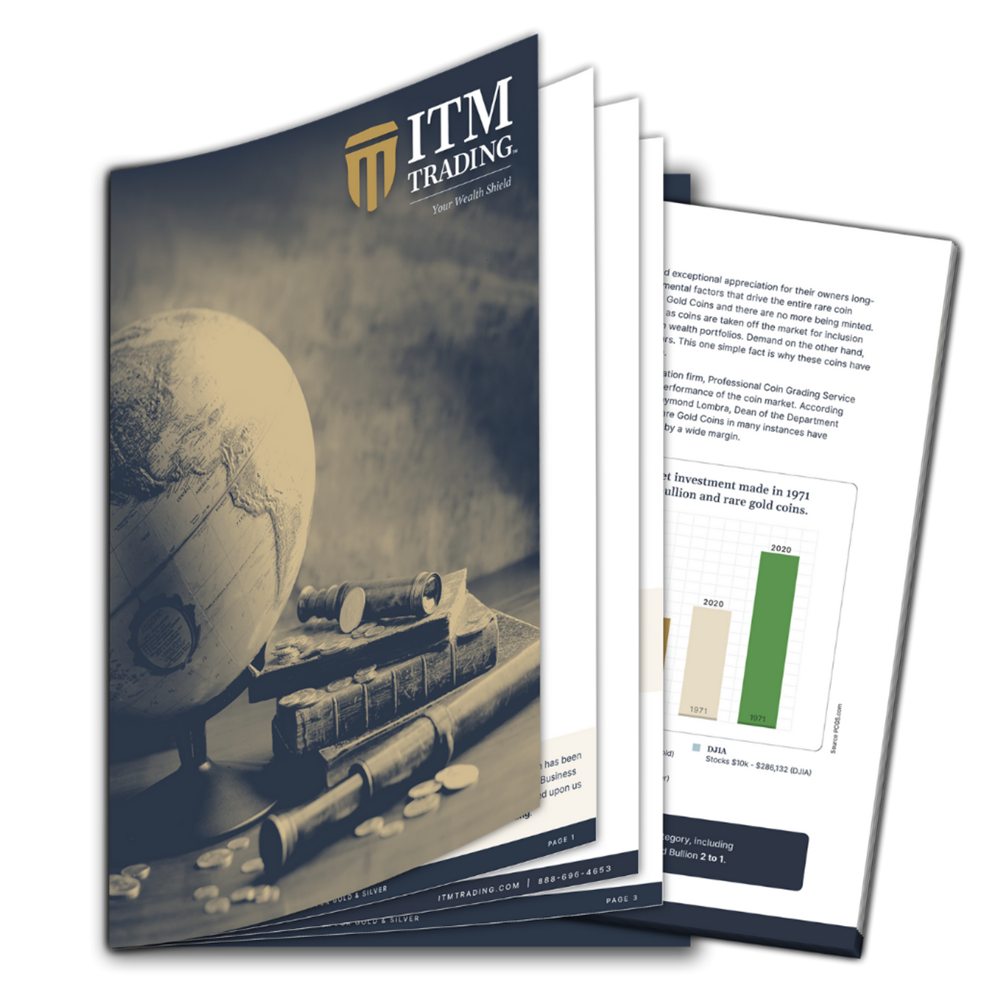An Economic Collapse Far Worse Than Great Depression If USD loses Reserve Status: Peter Zeihan

“When the only country saying that is Russia, then you know it’s not serious. And that’s exactly where we are right now,” says Peter Zeihan, geopolitical expert. He says China would need to internationalize its tightly controlled financial sector for BRICS to challenge the global order, which is a huge hurdle. Zeihan also dismisses the headlines about Saudi Arabia ditching the petrodollar, explaining that oil trades in non-U.S. dollars are minimal and lack long-term contracts. He emphasizes that Saudi Arabia’s financial moves are driven by security concerns, requiring a nation with a strong navy and ground presence in the Persian Gulf. “There is no country out there that has the fiscal depth or the liquidity necessary. There’s no coalition of countries to replace the US dollar,” he concludes.
CHAPTERS:
00:00 Serbia’s president warning
03:17 WWIII
04:10 Putin’s world tour
05:32 China v.s. the rest of the world
07:31 Nuclear weapons
09:00 De-dollarization
14:38 BRICS
16:42 US economy
20:16 Reality of the economy
21:31 Federal debt
27:48 Argentina
29:18 Europe / Georgia Maloney
33:27 Concluding words
TRANSCRIPT:
Hi, this is Daniela Cambone for ITM Trading. As you can see, we’ve changed location. It’s the summertime and we’re about to kick off our summer series. So I have a titan for you all today. Please welcome to the show Peter Zeihan. He is the host of the very popular podcast Zeihan On Geopolitics and the author behind the New York Times bestseller, The End of the World is Just the Beginning. Peter, I’ve been following you through all your beaches and all your podcast updates. I love it. You’re crushing the game. Nice to see you.
Peter Zeihan
Great to be here and pretty soon it’s mountain season. So starting in about an hour, I do my first mountain of the summer.
Daniela
Yeah, well, I’m sure a lot of folks in the audience are familiar with your podcast and those who are and I definitely invite you all to check that out. But we have a lot of serious ground and topics to cover. You know, that book came out in 2022. But judging on your content, because I’ve been following you, Peter, I don’t think you see the world any better than two years ago. And to that point, and I’ll give you the mic in a second. I thought of you when I saw the latest warning from Serbia’s president, warning of the biggest geopolitical crisis since World War II. He said, quote, this is Alexander Vucic speaking, “I expect the situation to escalate in the coming months and expect that we will face very serious consequences. I’m talking about Europe and the world.” He was addressing the state on the radio television of Serbia. He went on to say, “we are living in the time of the greatest geopolitical crisis since the Second World War. And I wanna tell you for the sake of history, since I of course have certain knowledge more than ordinary citizens and I often rely on what I feel through conversations with the biggest world leaders, I expect the situation to escalate in the coming months.” So a bit of a cryptic message here, but I was kind of quite concerned by this warning. What’s your take on it?
Peter
Well, I don’t want to overstate anything that involves Serbia. They’ve always been the drama queens of Europe and now that they’re surrounded by NATO and the European Union, they’re still trying to leverage the relationship with Russia in order to get more concessions out of Europe. But anyway, the overall message, the idea that the Ukraine war is becoming not just hotter but more consequential, that is absolutely in play. We’re seeing new tactics by both sides that have changed the face of the game and are introducing a series of new technologies into military conflict that the old system just can’t contain. Think of what’s going on with Ukraine right now with the new drones and new satellite weapons as something akin to what we went through with the American Civil War when industrialization first hit the field and when these technologies become cheap enough as they rapidly are to be used everywhere then the very nation state system is in a degree of danger because all of a sudden new players can bring guns to the party in ways that the old system simply can’t cope with.
Daniela
So that said, do you agree with him that we’re on the verge of some sort of World War III or has it already begun?
Peter
I don’t think of World War III. World War III applies a couple of coalitions fighting over relatively discrete geographies. I think instead what we’re seeing is a general breakdown of the old order. During the Cold War we had two very very clear power blocks based around Washington and Moscow. Now it’s much more diffuse and the United States because of decisions it’s made 30 -40 years ago and rejiggering its military is no longer capable of being engaged in multiple fields of combat at the same time. So you’re going to probably have a conflict in the East Asian sphere. You’ll probably have one in the Persian Gulf. We obviously are seeing one in the former Soviet world right now. And those are just the big three.
Daniela
Talk to me a little bit more about Putin’s world tour here. And if anything concerns you on this front, I mean, obviously we just saw his visit to North Korea and now in Hanoi. I mean, what do you think of that cozy relationship between Vietnam and Russia? And why isn’t Vietnam concerned about angering the United States over this?
Peter
There are very few places that Putin can go where the International Criminal Court arrest warrants aren’t in play, and most of them are places that are kind of the old hat, Syria, Iran, North Korea. Vietnam is a special case in that they’re very sovereignty happy and are not really interested in being part of a power block. But the reason I don’t worry about the Vietnam stop specifically is that the only reason that Vietnam and Russia have a positive relationship is because Russia has traditionally helped Vietnam against China. That’s where most of their weapons come from. It’s a big tech transfer place and the Vietnamese have always, always been paranoid about the Chinese and for good reason. So when I see Americans kind of losing their hat over issues that involve, you know, where is Vietnam’s loyalty really? Well Vietnam is loyal to Vietnam and as long as they perceive Russia as useful against China, that’s actually kind of a win for the United States.
Daniela
What do you worry about? I know you speak a lot about how it’s becoming China versus the rest of the world. I mean, is that what we should be paying attention? I’m just trying to figure out what keeps Peter up at night.
Peter
Well, let me give you two things. Number one, I would argue that the Chinese system is in its final years. Between the over-concentration of power in the person of Xi Jinping and their demographic collapse, this is a country that only has a few years left. And if we haven’t built out our industrial plant to replace the stuff that currently comes from China, we’re going to be in a bit of a pickle in a few years’ time. And by we, I don’t just mean the United States. I don’t mean just NAFTA. I mean everyone. You can’t take the world’s largest manufacturing power and put it to the side and expect everyone else to just get along la-dee-da. So that’s problem one. We need to frontload as much of this as possible. The second are those military technologies coming out of Ukraine.
The Russians are basically taking 21st century technology and marrying it now to 20th century dumb bombs. And now we have glide bombs in Russia that weight two tons. That is going to change the face of military conflict in a number of areas, because all of a sudden you can take a very, very stupid weapon and give it a degree of accuracy in a way that never existed before.
On the flip side, you’ve got the Ukrainians who, because of restrictions on arms transfers, but primarily because of the United States, has went out and found ways to develop their own weapons that have a range in excess of 800 miles. That, again, is something that second tier states have never had before. And today we’re cheering the Ukrainians and using them against an oppressor.
But tomorrow we’re going to be concerned about weaker states that suddenly have discovered that you don’t need that much of industrial plant in order to build your own mid-range weapons. So we’re on the verge of a new system here, where the rules of the game are going to be very, very, very different.
Daniela
Speaking about rules of the game, are you at all concerned about the use of nuclear weapons?
Peter Zeihan
At the moment, I am not. The issue is for countries to use nukes, they have to have a reason to think that that’s actually achieved something. So if Russia were to nuke Ukraine, that wouldn’t work because the Russians feel they need to occupy Ukraine and get to another line of countries further west. So that doesn’t make any sense. But if we get into a situation where Ukraine falls and then the Russians come into Eastern Poland, which is now a NATO ally, we now know that the Russian army could not stand up to the NATO forces. And in that scenario, all of a sudden nukes become a very, very real concern. That’s not a problem for this year but it is definitely something to be concerned about in mid-term.
Daniela
Who who do you think would be the first to push the button?
Peter Zeihan
It really depends upon the time frame. So if that scenario I just outlined rolls around, it’s clearly going to be Moscow. But if it happens on a slow enough time frame that other countries have a chance to react, Finland, Sweden, Germany, and Poland would all develop a deliverable nuclear weapon as quickly as they possibly could. So if it only took the Russians, from the point that they conquered all of Ukraine, say six months before they come to Poland, then it’s the Russian nuke you should be worried about. But if it takes them more like two or three years, then it’s suddenly the Polish nuke you should worry about.
Daniela
Wow, okay. Terrifying to even be speaking about that, Peter.
Peter Zeihan
We’re not there yet. We’re not there yet.
Daniela
I want to segue now into a whole other topic because I know you did a really good segment on it. And obviously the debate of de-dollarization has been reunited with these headlines surrounding the petrodollar and how the pact is over. Now look, I’ve had experts on all sides of the fence on this one, I just had Brent Johnson on, you know, the mastermind behind the dollar milkshake theory saying these headlines were totally overblown. But I know that you’ve said when it comes to moving away from the dollar that for you, Saudi Arabia matters. In fact, you’ve said it’s the only country that counts. Is that an accurate summary?
Peter Zeihan
That’s fair.
Daniela
Talk to me about where you stand on this. Is it news? Is it relevant? Is it happening?
Peter Zeihan
It’s definitely out there in all bold and all caps and it’s not that big of a deal. Let me give you the two things that I’ve been watching. Number one is what the Saudis are doing with the oil sales. Traditionally they’ve always been in dollars. Now they’re starting to do a few individual cargos. No long -term contracts, nothing like that. Just individual cargos in primarily Yuan. And the reason isn’t for finance. The reason is for security. The Saudis have always relied upon the United States as their sole security guarantor because militarily they are absolutely incompetent. So they park cargoes of crude oil off Louisiana just waiting for an order so that the Americans always think of them as the reliable supplier and in exchange the United States makes sure they remain independent. The Shale revolution has removed a lot of that from our point of view. We’re really not interested in those spare cargoes now. And during the Cold War we needed that oil to fuel the global alliance contained the Soviets. We don’t care about that very much anymore either.
In fact, the number one consumer, Middle Eastern crude is now China, which is a competitor. So the very argument that the United States carries about this at all is kind of limited. And so it it means that the Saudis, who can’t fight, won’t fight, need someone else to watch their back. And there just aren’t a lot of candidates.
It has to be a country with a navy that allows them to deploy to the region, and it has to be a country that can actually put boots on the ground in the Persian Gulf to fight off Iran. If the issue comes up. There are only four countries aside from the United States, five that theoretically could do that.
You’ve got Britain, France, Turkey, Japan and China. What the Saudis are doing are keeping their options open. So they do the odd cargo in Yuan to make the Chinese be more interested. And they’re doing the same thing in China today that they did in the United States in the 70s. They’re buying up refineries in China and retooling them to specifically run Saudi crude in order to build a dependance.
It’s not a stupid plan, but it’s not a whole scale overhaul of what they’re doing with currency policy. Keep in mind that the Chinese Yuan is not convertible. And if you’re a country like Saudi who has these huge flows of capital coming in, you want to put them into a deep, liquid market. And that’s still only the US dollar.
So we’re talking about low single digits of individual oil shipments being re-dominant. It’s not nothing but it’s not that much.
The other issue is what the consuming countries are doing. Countries that say they don’t like the US dollar or don’t like the United States system, for whatever reason, and everyone likes to go to the BRICs and talk about a BRICs currency.
Well, sorry folks, but at the Johannesburg summit last year, the Indians, the South Africans and the Chinese all in their opening statements, said that they have no interest in a non-U.S. dollar denominated system. They don’t want a BRICs currency. And will people please stop asking them about it? This is something that’s going on in the American subconscious. This is not something that has any real traction globally. In fact, the only country in the wider world who specifically wants something else is Russia. And they just want everyone to use the ruble, which is not going to happen.
Daniela
Well, I think to that, I mean, there were some theories floating around as to why central banks were amassing so much gold, particularly China. And were they looking to, you know, create some sort of gold backed currency as a, you know to beat the reserve currency out and usher themselves in. So, you know, outside of Saudi Arabia, grander scale, Peter, and outside the BRICs, I mean, are you not worried about dollarization? Do you not see it happening?
Peter
I’m really not worried now. also keep in mind the United States is not a trader in country. So if dollarization went away, I’m not saying there would be no consequences, but it’s not the sort of thing that really damages the U.S. in the long term. As for the gold issue, getting a little bit of more gold, increasing your currency reserves. That’s that’s generally a smart play regardless of what’s going on with international politics. And keep in mind that there’s not enough gold on the planet by a factor of 10,000 to generate a global currency that is gold backed. So yeah, this is not something I lose sleep over.
Daniela
Okay. So what do you think is the point of the BRICs? Because you see that there the continuously keep adding countries. They definitely control the oil supply of the world. Right now they’re having but they have a massive, you know, another big summit coming up. So what are they. What’s the point of the BRICs for you?
Peter
Never forget, BRICs was not designed by Brazil or Russia or India or China. It was designed by some guy in New York who was looking to build a fund that would trade bonds in large-ish economies. It was never anything more than that. Later, years later, leaders of these countries found it useful to caucus. But really it’s just Russia caucusing with China, Brazil with China, India with China. Because China was the manufacturing hub and the larger economy than the rest of them put together. It hasn’t evolved past that. And by bringing in new members, all you’re doing is guaranteeing that nothing will happen. Bringing in Iran and Saudi Arabia at the same time? BRICs has basically made itself irrelevant.
Daniela
So they just keep meeting in your opinion, because it’s just smoother, easier.
Peter
Each of these individual countries have reasons to have institutionalized conversations with China. That’s not nothing. A global revolution is not is not.
Daniela
Why don’t you think, I’m just playing devil’s advocate here. That, you know, maybe they said that last year, but now they’re saying, hey, you know what? We have enough clout, we have enough power. We have enough countries here where we becoming the world versus the United States that we could the throne, the US as having the reserve currency of the world. Why couldn’t that conversation happen in your mind?
Peter
When the only country saying that is in Russia, then you know it’s not serious. And that’s exactly where we are right now. If China decides that it wants to internationalize its financial sector, then there’s a conversation to be had. But that means the Chinese Communist Party is giving up control over its financial sector. And that would be a much bigger deal than any theoretical BRICs effort to change the global order.
Daniela
I want to talk about the American economy now, and I know it’s a loaded question, but, do you see the economy in good shape?
Peter
At the moment, yes.
Daniela
Make your case for that of why you don’t see our recession on the horizon, or that perhaps already started.
Peter
Let me give you what to watch for if this is going to turn, globally, demographics are shifting or the birth rate globally has been too low for too long. And it’s starting to challenge the economic models that underpin capitalist economies.
Capitalist economies are ultimately about a balance between investment and consumption. And consumption is not just what drives domestic economic activity, but what drives international trade. But when the birth rate is too low for too long, consumption starts to falter. And that’s where we are in China and Japan and Korea and Taiwan and Thailand and Germany and Italy and on and on.
And so in those countries, the rules of the game are understanding of the interrelationship between inflation and consumption and production and taxes are all unraveling and we’re losing the capacity to understand what’s going on under the hood of the economy. At the moment, that’s not happening in the United States. Our birthrate has been higher than everyones for a while. It’s been higher than China’s now for over almost forty years. And consumption is still the single biggest factor driving economic activity through the United States. So for us, the old rules, for the moment, hold. And probably will for a few more decades.
So when I look at the United States, I look at consumption, I look at retail sales. I look at first time unemployment claims. I look at unemployment in general. And the normal things that have driven the US economy. Consumption. Credit. Investment. And employment levels. All look green. I understand why there are concerns. I understand that in some sub-sectors, what I just said is not true. But overall, it looks ok.
The question on the job’s front and on the consumption front. And those are the two single most important things the US system. Now if we have delinquencies rise on, say mortgages, then you start getting into traditional concern about a financial recession. And we have seen delinquencies come up but we are well below the 50 year average. And we’re nowhere near where we’ve been at the kickoff point for every recession to this point. So again, for the moment, things look pretty good.
My concern is that Federal spending has increased year on year. To a level that is now starting to challenge consumption, is the primary driver. If that were to happen for several years, the concern wouldn’t necessarily wouldn’t be recession per say. But that the warning lights that we would normally look at suddenly don’t mean as much. Because that’s where we are in Germany, Italy, Japan, and the rest.
Daniel
I want to focus on that point right there. But before that, I, you know, I see the data and, you know, job openings, by the way, not good. But when you speak to everyday folks, Peter, I know, I know, you do like the youth when they’re going to vote. Their number one issue is that they can’t afford a house. When you speak to folks who are retired, they’re coming out of retirement looking for part time jobs because they can’t pay their bills, they can’t afford groceries. So for the everyday American, they’re going to listen to this and say, Peter, I don’t see that strong economy. I’m not feeling it.
Peter
And that’s fair. Just because the economy on the whole is doing well, doesn’t mean it’s doing for everyone. Doing well for everyone. Inequality is an issue in this country. There’s no way you sugarcoat that. And people who are trying to get into the system and the housing issue is pretty easy to explain. We stopped building for a few months during Covid and everyone was shell shocked, so new construction just slowed down and we now probably have a shortage of 4 million homes.
You combine that with the most dynamic internal migration we’ve seen in the country in 40 years. As people move to places where there are more jobs and there’s housing shortages in the high growth locations. Now, believe it or not, this is a good problem because it’s ultimately based on an increase in supply and demand throughout the broader economy. But if you happen to be the low man on the totem pole during that transition, it’s not a pleasant experience.
Daniela
To your bigger point, though, right? The spending, the debt and why the political class in America is not talking about the debt issue. and just to put things in perspective, we have 2 trillion in annual deficits and 100 trillion of baseline deficits projected to 2050. I mean, this is an unsustainable…
Peter
I think that is I think that is unduly conservative for where we’re going to be on the debt situation
Daniela
Okay. But fiscal Armageddon upon us?
Peter
Well, no, not that, but okay. So number one, there’s not going to be another currency. So the United States has the opportunity to monetize as a fiscal conservative. But it provides us with a lot more flexibility than anyone else would have. And we will use it. Number two, the reason why the debt is going to get bigger, the baby boomers who are about half retired now are going from the largest tax paying class in American history to the largest tax taking class in American history.
And that imbalance, we’re only at the beginning of that process that will last another 15 years until the majority of the baby boomers are gone. so the deficits we have now are nothing compared to what we’re going to have in five, ten years. Third, the politics of it. We’re going through a political reshuffling. What defines the Republican Party is already shattered.
And what it defines the Democratic Party is in the process of breaking. So in this, when we’re in a late party structure like this, you get personalities that dominate the structures rather than ideas or movements. And you get candidates like Biden, like Trump, who have defined populism as their ticket to power. And both of them plan to significantly expand spending for any number of reasons moving forward.
And because the baby boomers are soon to be a voting but not income generating class, that is the target of these policies and it will be popular with them. And if you’re a Gen X or younger, you’re left with the bill. So whatever you think is going on with the debt, I can guarantee you it’s worse. But we also have a lot more flexibility because of the globalization. I’m sorry, not globalization, but because of the internet internationalization of the US dollar.
As long as the dollar is the reserve currency, that allows us at least 100% of GDP buffer in our debt. I mean, always look at Japan for what is possible. Here’s a country that has a combined debt with pension arrears of almost 500% of GDP right now, and they’re still there. We’re only at about 100%.
Daniela
Hold on. You brought up Japan. I want to bring up an article that my good friend Frank Schuster wrote for the Toronto Star, where he said, super debt cycles have happened every seven years. He said Japan currently holds the world’s largest amount of U.S. treasuries. The U.S. has relied on Japan to buy large quantities of their debt. If that buying were to turn into selling, there would essentially be no foreign buyers of US debt left, and the fed would have to become the buyer of last resort.
Peter
Well, number one, that would be a stretch because T-bills earn them more than their own internal debt. But number two, even if the fed was the only buyer. Okay, let me let me give you a quick example. Okay. There’s every couple of years some academic asshat in China starts talking about how if we just dumped $3 trillion in treasuries on the market, we could end the US dollar system.
And there’s always some guy at the US Federal Reserve, I think he’s out of Saint Louis who just issues the same reports like I don’t know if you knew this, but if you were to dump a lot of treasuries onto the market at the same time, they might go down to 50, maybe even $0.30 on the dollar. But I don’t know if you knew this. The U.S. Federal Reserve controls the U.S. money supply, and it’s digital now. So we could go and expand the money supply by the exactly the number that you dumped and retire $3 trillion of debt for less than $1 trillion. Please, please do that.
Daniela
I want to get to your point. Back to your point about basically, okay, the debt that we’re going to be amassing is going to be astronomical. But as long as the US dollar is the reserve currency, the whole ecosystem continues to work and everything is fine. But let’s play out that scenario, Peter. And I know that you don’t see it happening, but let’s play it. Let’s just please just tickle me first. I can fancy me here. Whatever the expression is, that the US dollar is no longer the reserve currency, and there’s a breakdown there. Then what happens?
Peter
Okay. Well, let’s look at the side you want to hear and then we’ll talk about the side. You don’t want to hear the side you want to hear. Yeah, that’d be a problem. We’d actually have to live within our means. We’d have to cut our, primary deficit by at least 4% of GDP. That is roughly equivalent to the entirety of what we spend on Medicare and Medicaid.
We could not do that without feeling some pain. Now, it wouldn’t be a Greek style pain. It wouldn’t be like a British 1980s style pain. It wouldn’t be an Argentina or a Turk style pain. It wouldn’t be a cultural revolution pain. But we’d have to tighten our budget and would probably be like a 1990 1991 degree pain. We’d feel it. Absolutely.
What’s the global currency now? Because it matters. There is no country out there that has the fiscal depth or the liquidity necessary. There’s no coalition of countries to replace the US dollar. So if we just move away from the concept of a global store of value, you are talking economic collapse and something far worse than the Great Depression for pretty much everyone in Northeast Asia and Western Europe, not to mention the developing world where debt crises would go through the roof.
And then all of a sudden, people are clamoring for the one currency that has any degree of depth or liquidity. And all of a sudden the world has bailed out the US dollar.
Daniela
Well, therein lies the danger that keeps me up at night, Peter at least thinking, you know that, okay, it’s just always going to be the dollar will always be the reserve currency of the world. You mentioned Argentina. Are you optimistic with the reforms you’re seeing there and everything? Malaysia is….
Peter
Oh, that is wild. Yeah, Argentina is a little bit like the United States in that it has a well educated population. A positive demographic structure. Produces a lot of commodities that are in need by the wider world. Has a value added manufacturing system and its security concerns are relatively limited. If Argentina is going to go off the rails, its going to be because of domestic politics, just like here. And 90 year ago, politics took Argentina off the rails and it’s been off ever since. The new leader Milei has been doing more to rationalize the governing system and the budget than we have seen in any government to this point. And so it does’t take a lot of progress in a place like Argentina to allow the fundamentals to kick in and generate runaway economic growth.
It’s not that there aren’t some comas and some caveats in that. But that’s the overall story. The bones are very good. And so far in his first year I gotta say Milei has been able to strike some compromises with the Coronas that have been pretty positive. So I am I’m hopeful.
I don’t think that Argentine is going to be coming back to international capital markets any time soon. They still have a lot of stuff to clean out. And the proneness are are certainly not done, but they still control Parliament. But at the moment, very, very optimistic about the trajectory for the country.
Daniela
Speaking about optimistic, let’s talk Giorgia Meloni a second here and how, I mean, Italy has been dormant for 70 years. And now look at her. So so talk to me about what you think she’s doing for Italy for, for for Europe and the, the really the right wing movement that we’re seeing in Europe. Some experts have had on Peter said that Europe is just headed for absolute collapse here. They’re quite concerned for Europe. What’s what’s your take?
Peter
Well let’s start with the big picture. Demographic. And Italy is the oldest country Europe demographically and the fastest aging. And they have already seen that bulge of people in their population move into that mass retirement. And then every generation after it gets smaller. So whoever has the honor of ruling Italy is going to be dealing with an ever more difficult situation, from a fiscal and a financial point of view.
And if Meloni can, loosen up the artificial restrictions on, say, labor and capital in Italy, that will obviously have an upside effect. But the overall trend working against her is only going to get stronger. Moving on. So I don’t know if it’s enough. Italy’s no longer in a position where it’s fighting for time, it’s fighting for its modern economic existence, and that fight is only going to get more difficult.
And I don’t think Meloni is going to be able to deflect that, because she would need to be able to go back in time, 50 years until everyone to have twice as many kids. And I’m unaware of any breakthroughs in those technologies. That said, you’re right, Italy has basically, for the last 70 years, sit back and let the European Union make all the big decisions.
And for the first time in modern Italian history, that is no longer the case. And I think the most successful thing that Meloni has done to this point is not simply reestablish Italy as a player in Europe, but convince most Europeans that her flavor of the right is not sufficiently radical to be overly concerned about. And the fact that she’s been able to build these, stats, political alliances with European centrists, I think is a really good sign for both Europe and for Italy.
And the fact that she is broken with most of what people consider to be the hard right in Europe on issues like, say, Ukraine, is quite significant. Italy has emerged as like the second or third most supportive country for Ukraine in Europe. And no one would have expected Ukraine to be in the top five of anything 5 to 10 years ago.
Daniela
On that point, we can wrap here. I know I’ve read who you think will definitely win the election in a landslide, but let’s play out that it is Donald Trump, and let’s play out that, you know, the first thing he does is pull out, pull the US out of from Ukraine. What does that world look like?
Peter
Well, domestically, we have a series of rolling constitutional crisis as a convicted felon tries to pardon himself and all the fun and games in our court system that come from that. So he will be the most constrained and embattled president in American history. he will have no time to govern, much less deal with foreign affairs. And from an organizational structure point of view globally, that would be, you know, less than ideal.
In terms of the NATO front, if his decision and I’m not suggesting that he would do this, I’m saying I have no idea what Trump will do, because it’s all has to do with whoever flattered him most recently. If he did pull all support for Ukraine, we would have a nuclear capable Germany, Sweden, Finland, Romania and Poland as quickly as they could possibly manage because it would be the only way they could guarantee their security. Because these countries, especially Finland, Poland and Romania, know that if Ukraine falls, they are next.
Daniela
Wow, talk about a round up. Peter, I want to thank you for joining me today and adding your perspectives. I mean, just final thoughts. you know, I have a lot of people in the audience quite concerned, you know, watch the news. And just this terrible headline after terrible headline. What’s your final thoughts just to people watching here?
Peter
I’m actually feeling pretty good about where we are right now. For most purposes, the US economy is doing all right. It’s based on demographics, and it’s based on local consumption. And those look solid in terms of the international picture. You know, even from the worst point of view, we’re basically seeing a civil war in the former Soviet Union.
And as long as that is happening, the former Soviet Union is not a singular bloc like it was back during the Cold War. So its capacity cause international mischief is less. It doesn’t mean there’s not a lot of humanitarian awfulness, but we have seen the Western world unite in a way that has never been united before. And even during the cold War, because all the former Warsaw Pact countries are now on our side, and Estonian is the new foreign policy chief in Europe.
This is fantastic. We’re seeing the Chinese commit not so slow motion suicide, which is triggering the greatest industrial build we have ever seen, faster even than in World War two. There’s a lot of positive out there. It would be nice if we could fix our politics faster than we’re doing it, but we will get there too. This is not the first time our political system has been in uproar. This is the sixth. This too will pass.
Daniela
Peter Zeihan. Like I said, be sure to, follow his great podcast Zeihan on Geopolitics. I hope to see you soon, Peter.
Peter
That would be great.
Daniela
From our summer home. We’re just getting, settled here and are about to kick off the Daniela Cambone show summer series with more incredible guests, just like Peter. So be sure to stay tuned. In the meantime, don’t forget to sign up at the DanielaCambone.com to stay on top of it all. That’s it for me. Thanks for watching.
SOURCES:
https://www.aa.com.tr/en/europe/serbia-s-president-warns-of-biggest-geopolitical-crisis-since-second-world-war-/3257217
https://fiscaldata.treasury.gov/americas-finance-guide/federal-spending
https://frankgiustra.com/posts/fiscal-armageddon-looms-and-no-one-in-power-wants-to-talk-about-it-heres-why-you-should-be-afraid/














